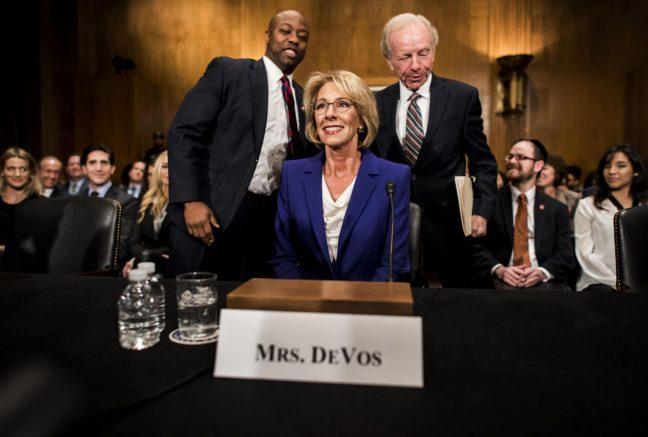For-profit colleges are a distinctly American phenomenon. Perhaps they could only have proliferated in the country that has most thoroughly digested the philosophy that every aspect of our lives deserves a market.
Betsy De Vos’s effort to repeal guidelines that prevent for-profit colleges from receiving federal loans if their students do not make enough money after graduation to pay off those loans is true to this spirit. In the midst of a student debt crisis that has saddled American college graduates with a combined sum of $1.5 trillion owed, it is an attempt take the leash off of, historically, one of the most exploitative sectors of education.
The rap sheet for for-profit colleges is a mile long and stretches back decades. It includes fraud, fly-by-night operations and most commonly a simply ridiculously overpriced education. For-profit colleges are not simply private colleges that make a profit. Their profit comes almost exclusively from enrolling undergraduates and tapping into their student loans rather than from say, research, athletics or endowments, the more traditional money spinners of higher education in this country.
That means they have an iron-clad incentive to get as many undergraduates in their doors as possible, no matter how prepared the students are for college or how employable they will be once they graduate. Squeezing undergraduates is not just a side benefit for these colleges, it is their entire profit model.
The guidelines Betsy De Vos is seeking to repeal were an attempt to curtail the profiteering that has for a long time been rampant in these colleges. For-profit colleges have for a long time been known to target vulnerable populations, such as low-wage workers and first-generation college students. They promise employment and earning far beyond what one could hope to receive without a college degree. They vocalize what non-profit colleges have been mouthing for years now — one needs to attend this college or they won’t make it.
The bitter truth is that they are often correct. As our country de-industrialized, unions were beaten back and the ways to earn a decent living outside of a college education dried up — the hand of the for-profit colleges only grew stronger. Going to college isn’t about education anymore if it ever was — it’s a survival tactic. Couple that with student debt, and today the education system encapsulates the circular logic of our economic reality. We must go to college to avoid poverty — now, if we are unlucky, going to college may guarantee our poverty.
Candidate for treasurer hopes to decrease student loan debt, deter fraud for elderly
Advocates for for-profit colleges have bemoaned the regulations on several grounds. They cry that the same standards were not applied to state or private non-profit universities. This is certainly true, although it takes little introspection to understand why. Students that attend non-profit colleges are hit with outrageous student debt and an uncertain job market just like students at for-profit colleges, but they at least have the small comfort of not being their institution’s profit source. The only unfairness is not including traditional university students in the protections.
For-profit college proponents have also taken pains to paint themselves as playing a major role in filling the need for a college education, particularly for vulnerable populations. This is an obfuscation of the purpose of these schools, which is making money. It is similar to the suggestion that the purpose of say, Ford, is to make cars. This is only true at first glance — the purpose of Ford is to make money, cars just happen to be the form. The engineers in the factories are producing cars, just as the professors in the colleges are educating. But this is fairly immaterial to the purpose of the institution as a whole. So while some graduates of for-profit colleges may find their experience a ladder to stability, others will not, and the machine will keep chugging along, fairly indifferent. In vintage American form, the entry-point to our own exploitation is presented to us as a path to a better future.
Private math-education grants beneficial, but indicate flawed, failing U.S. educational system
This is the commodification of education at its lowest ebb so far. We are forced to shackle ourselves with student debt — now our jailers have stopped even paying lip service to the idea of future employment. The system was exploitative when students were being prepped for future employment — it is all the more so now they are being prepped for life in and around a surplus labor population.
As the guardrails come off, we are told to act as informed consumers, buying from an industry that spends billions of dollars on disinformation: “marketing,” as the industry calls it. In fact, the onset of this vulture privatization is likely to do little more than complete the assimilation of education into American capitalism, with all its ugly connotations. For the masses of dispossessed people in this country, the desperation will only grow.
Sam Palmer ([email protected]) is a senior majoring in biology.








